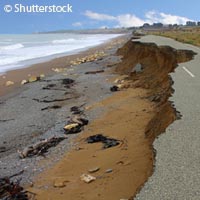A modern approach to coastal management
Coastal areas are vital economic hubs for communities, industry, agriculture, trade and tourism. But as coastal economies continue to develop and the effects of climate change become more apparent, the risk of long-term environmental damage also grows. The EU-funded project THESEUS ('Innovative coastal technologies for safer European coasts in a changing climate') is working to develop a European response to reduce such risks and ensure coastal economies and livelihoods are sustainable. THESEUS' researchers, coordinated by the University of Bologna, are looking at innovative strategies to meet the emerging challenges. These include: - restoring or creating coastal habitats; - applying hydro-morphodynamic techniques such as wave energy converters, sediment reservoirs, multi-purpose structures and flood-resistant dikes; - taking action to reduce impacts on society and the economy, such as through the promotion of risk awareness or spatial planning; - using advanced information systems to support defence planning. THESEUS research activities are being carried out at eight study sites across Europe, with specific attention paid to the most vulnerable coastal environments, including deltas, estuaries and wetlands, where many large cities and industrial areas are located. Part of the work has involved collecting a wide range of information about current flood systems. Interviews with local planners, policy makers and stakeholders were carried out, flood extents were modelled, and a variety of techniques were used to estimate the uncertainty associated with event prediction. Project partners say the main challenge was to bring together people with different specialities and theoretical approaches. All data were collated and made available to team members via an on-line database. In parallel, a large number physical and numerical modelling tests were undertaken for energy converters, submerged structures, bottom vegetation, dikes, floating structures and breakwaters. Field work was carried out at sites across Europe and along China's Yangtze River. For example, experimental work in the Netherlands and the United Kingdom quantified differences in wave attenuation over natural reefs. In France, researchers compared management strategies for degraded sand dune habitats. The researchers say one of the project's successes has been to draw attention to current problems with coastal management. Partners have disseminated project results to the scientific community, government, and other end users through presentations at international scientific conferences, national meetings and local events. The project's work has received national press coverage. THESEUS also developed comprehensive guidelines for coastal management. These guidelines integrate best practice measures into a coherent, strategic policy for specific coastal areas. The guidelines take into account relevant environmental, social and economic issues. The project, which is scheduled to complete its work by November 2013, received EUR 6.5 million from the EU. The consortium brought together researchers from universities, meteorological agencies, port authorities and other specialists, from 11 EU countries and from the US, Mexico, Taiwan, and Russia.For more information, please visit: THESEUS http://www.theseusproject.eu/ Project factsheet University of Bologna http://www.eng.unibo.it/PortaleEn/default.htm
Countries
Belgium, Bulgaria, Germany, Denmark, Greece, Spain, France, Italy, Mexico, Netherlands, Poland, Russia, Taiwan, United Kingdom, United States



